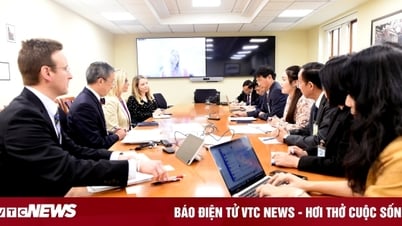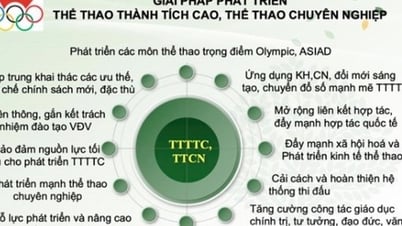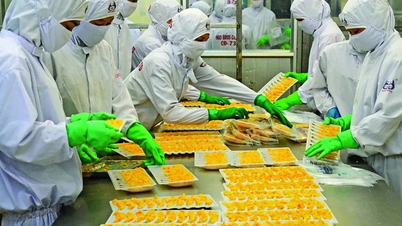Celebrities' online sales activities are currently not subject to much censorship or legal constraints - Photo: TT
According to the search trend report just released in early April 2025 by Coc Coc browser, a series of keywords related to false advertising scandals and lack of transparency in charity skyrocketed in the first three months of 2025 in Vietnam.
Erosion of social trust
After the case of false advertising of the product "Kera vegetable candy" was punished on March 20, the number of searches for "Hang Du Muc" increased by 270%, "Nguyen Thuc Thuy Tien" increased by 27%.
Or in the scandal related to Pham Thoai's charity activities, the keyword "Pham Thoai" increased by 153%, and "baby Bap's mother" - the person directly involved - increased by 13,100%. These numbers clearly reflect the change in public attitudes: from admiration to skepticism, from trust to demand for transparency and social responsibility.
Speaking to Tuoi Tre, Ms. Vu Kieu Trang, head of Coc Coc's communications department, said that the influence of KOLs, KOCs, reviewers or livestreamers on social networks is increasingly large in guiding consumer behavior. When operating responsibly, based on expertise and real experience, they are an effective bridge between brands and consumers.
Information shared objectively and honestly not only helps users make informed choices, but also contributes to increasing business value, building market trust and spreading pride in Vietnamese products.
However, if left unchecked, this rapid growth also brings with it a worrying downside. That is, when content is irresponsible or driven by short-term interests, the result is confusion between truth and falsehood in an information matrix that is increasingly difficult to control.
"This not only affects brand reputation, but also pushes consumers into a state of skepticism and loss of trust - something that is very difficult to build and easy to lose," Ms. Trang commented.
According to many communication experts, in today's open information context, anyone can become a spokesperson for a brand.
The fact that some individuals claim to be experts, use technological tricks or gimmicks to build up virtual credibility, then promote products in an objective and inaccurate way is significantly eroding consumer trust.
When individuals take advantage of the title of expert, operating without any censorship or legal constraints, the risk of consumers falling into a situation of losing money and getting sick is entirely possible.
There are cases where when the truth is revealed, the consequences are no longer simply a wrong click. The consequences at this time do not stop at a few harmless "windy" words but have truly affected the wallet, trust and even the health and safety of consumers.
There needs to be professional ethics standards.
Commenting on the current chaos of KOLs and KOCs, Ms. Hoang Huong - CEO of Unikon Company - said that over the years, sanctions and laws have not kept up with the management of this new group of people as a profession.
"This still seems to be the definition of a "freelance profession", everyone defies standards to become a "content creator", to attract views, to have followers and to make money from it", Ms. Huong said.
Specifically, from being an influencer who advertises to support sales, to shaping the community, many individuals can turn themselves into manufacturers, business owners to produce, supply and distribute products from AZ. From here, creating endless "power" for this group of influencers.
In the long run, this creates imbalance and unhealthy competition in the market, and quality standards become vague concepts. Meanwhile, buyers are not protected, nor do they have the necessary skills and knowledge to protect their rights.
"Everything is traded with trust, buying with trust, listening and being influenced by emotions and there is nothing to guarantee or protect them. Because there is no law clearly regulating the rights and responsibilities of those who practice "content creation" on social networks," Ms. Huong shared.
Sharing the same view, Ms. Trang also said: "It is time to establish a set of professional ethics standards specifically for commercial content creators, similar to journalists." Authorities can consider issuing practice certificates, combining technology applications to monitor and periodically evaluate the activities of the above group of people.
"This is a necessary step to ensure fairness in the value of contributions and shared benefits between content creators, brands and consumers, while contributing to building a more transparent and safe online environment," Ms. Trang proposed.
Fines are not enough, criminal penalties are needed.
Many experts believe that the penalty mechanism needs to be strong enough to deter and prevent intentional acts that harm the community. Punishment should not stop at removing videos or imposing administrative fines. Cases of intentional advertising and spreading false information may need to be handled by authorities as violations of the law, not just media errors.
Sharing with Tuoi Tre, lawyer Tran Minh Hung (Ho Chi Minh City Bar Association) said that the act of famous people and influencers on the internet falsely advertising products is a very dangerous act.
There are many cases where individuals are not actually sick, do not use the product, but pretend to be cured thanks to that product to gain the trust of fans. Taking advantage of the public's trust in idols, brands have hired them to promote and boost sales.
Lawyer Hung recommends that consumers should be careful, only buy products from reputable sources and not blindly trust celebrities to avoid "losing both money and health".
Lawyer Dau Duc Ninh (Binh Duong Province Bar Association) said that influencers’ advertising of exaggerated and misleading information is becoming more and more common, seriously damaging consumer confidence. He said that current administrative penalties are not enough of a deterrent, because the fines are too light compared to the profits they earn.
Therefore, it is necessary to consider criminally handling cases of taking advantage of trust to advertise falsely, make illegal profits and appropriate other people's property.
There needs to be separate laws for social media influencers.
Some countries like China have issued strict regulations on online influencers for many years. Authorities coordinate with broadcasting platforms to verify real identities; build guidelines, ethical standards, and a scoring and ranking system, and impose penalties based on these standards.
China also created a list of prohibited content and a strict content censorship mechanism. Along with that are regulations on advertising, such as posting articles with advertising elements, introductions must be clearly labeled; regulations on the scope of advertising or not providing misleading information...
In particular, authorities require certificates and degrees appropriate to a number of KOLs in specialized fields such as medicine, education, finance, etc.
Ms. Hoang Huong, CEO of Unikon Company, said that Vietnam's Cyber Security Law has regulations on users and statements on social networks in general, but is not clear about regulations and sanctions for groups of people who can have a wide range of influence like the KOL group.
In addition, the penalty regulations also need to clearly define the joint responsibility of broadcasting platforms or social networking platforms, to create more drastic mechanisms in suggesting content that affects users and customers of the platform.
"After nearly 20 years of development, social networks are no longer a "virtual" space but real life. It needs strict regulations on information and career management, ethical standards and clear instructions for use for relevant parties," Ms. Huong suggested.
A series of TikTokers and YouTubers have fallen into legal trouble.
Being active on social media helps many people become famous, earn a lot of money, and have fans. However, among them, there are people who stumble and fall into legal trouble.
Just this week, Mai Van Duong (Quang Nam) - a TikToker with a large number of followers, owner of the account Duong Duong Duong - was prosecuted and detained by Quang Nam Provincial Police.
In fact, cursing others and creating gossip is also one of the quick ways for this TikToker to become known to many people.
Taking advantage of the spread, he also took the opportunity to sell feng shui items, agarwood buds, housewarming powder... In the group caught up in the law, there were people who not only stopped at making wrong statements, but also committed many harmful and fraudulent acts.
In recent years, many YouTubers have also been arrested for a variety of crimes. Famous on social networks, creating a prestigious appearance along with wealth, but many people have also fallen into the net of the law, violating the business process, advertising or selling fake, counterfeit goods of unknown origin.
At the end of last year, the Market Management Department temporarily seized a warehouse containing more than 10,000 bottles of perfume of unknown origin in Hanoi. This is the warehouse that TikToker Phan Thuy Tien (more than 4 million followers) actively sold and advertised.
Influencers must have a practicing certificate
Livestream sales activities need to ensure shared benefits between content creators, brands and consumers - Photo: QUANG DINH
It is time to strictly manage the activities of influencers (KOL/KOC) on social networks to end the current "chaos".
1. Need to update the law and clearly define the subjects
The Advertising Law needs to be updated, adding a legal definition for the group of "endorsers" - including KOLs, KOCs, influencers at all levels. This helps distinguish them from ordinary users to apply appropriate management regulations.
Individuals with 50,000 or more followers should be required to register with the authorities, similar to registering a business website with the Ministry of Industry and Trade.
2. Professional certification and code of ethics
KOLs/KOCs need to attend training courses on media ethics and advertising law and be granted a practice certificate. This is a solution to limit "self-proclaimed" status and enhance professional responsibility.
In addition, there should be a mandatory code of ethics, emphasizing transparency and honesty in advertising, especially for health-related products. KOLs/KOCs must verify information and product origin before introducing them.
3. Transparent advertising content
All advertising content must be tagged with an identifying hashtag such as #QuangCao, #TaiTro or a label displayed directly on the video for users to easily recognize. Advertising contracts must also be made public according to legal requirements.
4. Sanctions strong enough to deter
The current fine (VND 20 - 100 million according to Decree 119/2020) is not enough of a deterrent compared to the actual income of KOLs/KOCs. Therefore, it is necessary to increase the fine by 10 - 20 times, and even criminal prosecution may be required if serious consequences are caused.
In addition to fines, additional measures such as banning activities, removing content on all platforms, and publicizing the list of violations... are also proposed.
5. Strengthen monitoring and platform coordination
Monitoring activities need to combine technology (AI to detect non-public advertising), coordinate with platforms such as TikTok, YouTube, Facebook and feedback from users. At the same time, there needs to be a channel to receive denunciations and a quick processing mechanism.
VO QUOC HUNG (Chief Growth Officer, Tonkin Communications)
Poll
After the recent controversy involving some celebrities livestreaming to sell products, what do you think about celebrity livestreaming activities:
You can select 1 item. Your vote will be public.
1. Still interested and following the livestream, ready to buy if needed.
2. Trust is down, only watching livestream and not wanting to buy.
3. No more trust, stop watching livestream sales.
Other opinions
VoteView results
Read moreBack to Topic Page
Back to topic
PLUM BLOSSOM - VIRTUE
Source: https://tuoitre.vn/can-xu-hinh-su-cac-youtuber-tiktoker-kiem-tien-bat-chap-20250412013515987.htm









![[Photo] Prime Minister Pham Minh Chinh chairs conference on anti-smuggling, trade fraud, and counterfeit goods](https://vphoto.vietnam.vn/thumb/1200x675/vietnam/resource/IMAGE/2025/5/14/6cd67667e99e4248b7d4f587fd21e37c)

















































































Comment (0)